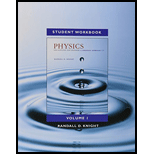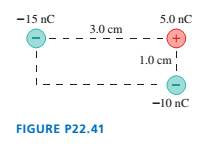
Student Workbook for Physics for Scientists and Engineers: A Strategic Approach, Vol 1. (Chs 1-21)
4th Edition
ISBN: 9780134110646
Author: Randall D. Knight (Professor Emeritus)
Publisher: PEARSON
expand_more
expand_more
format_list_bulleted
Concept explainers
Textbook Question
Chapter 22, Problem 41EAP
What is the force

Expert Solution & Answer
Trending nowThis is a popular solution!

Students have asked these similar questions
14
Z
In figure, a closed surface with q=b=
0.4m/
C =
0.6m
if the left edge
of the closed surface at position X=a,
if E is non-uniform and is given by
€ = (3 + 2x²) ŷ N/C, calculate the
(3+2x²)
net electric flux leaving the closed
surface.
No chatgpt pls will upvote
suggest a reason ultrasound cleaning is better than cleaning by hand?
Chapter 22 Solutions
Student Workbook for Physics for Scientists and Engineers: A Strategic Approach, Vol 1. (Chs 1-21)
Ch. 22 - l. Can an insulator be charged? If so, how would...Ch. 22 - Can a conductor be charged? If so, how would you...Ch. 22 - Four lightweight balls A, B, C, and D are...Ch. 22 - Charged plastic and glass rods hang by threads. a....Ch. 22 - A lightweight metal ball hangs by a thread. When a...Ch. 22 - Prob. 6CQCh. 22 - Prob. 7CQCh. 22 - The two oppositely charged metal spheres in FIGURE...Ch. 22 - Metal sphere A in FIGURE Q22.9 has 4 units of...Ch. 22 - Prob. 10CQ
Ch. 22 - Prob. 11CQCh. 22 - Prob. 12CQCh. 22 - Reproduce FIGURE Q22.13 on your paper. Then draw a...Ch. 22 - Prob. 14CQCh. 22 - The electric force on a charged particle in an...Ch. 22 - A glass rod is charged to +8.0 nC by rubbing. a....Ch. 22 - Prob. 2EAPCh. 22 - 3. A plastic rod that has been charged to —15 nC...Ch. 22 - A glass rod that has been charged to + 12 nC...Ch. 22 - Prob. 5EAPCh. 22 - Prob. 6EAPCh. 22 - Prob. 7EAPCh. 22 - A linear accelerator uses alternating electric...Ch. 22 - Prob. 9EAPCh. 22 - Two neutral metal spheres on wood stands are...Ch. 22 - Prob. 11EAPCh. 22 - You have two neutral metal spheres on wood stands....Ch. 22 -
13. Two 1.0 kg masses are 1.0 m apart (center...Ch. 22 - Two small plastic spheres each have a mass of 2.0...Ch. 22 - Prob. 15EAPCh. 22 - Two protons are 2.0 fm apart. What is the...Ch. 22 - What is the net electric force on charge A in...Ch. 22 - What is the net electric force on charge B in...Ch. 22 - What is the force F on the 1.0 nC charge in FIGURE...Ch. 22 - What is the force on the 1.0nC charge in figure...Ch. 22 - Object A, which has been charged to +4.0 nC, is at...Ch. 22 - A small plastic bead has been charged to —15 nC....Ch. 22 - A 2.0 g plastic bead charged to —4.0 nC and a 4.0...Ch. 22 - Two positive point charges q and 4q are at x = O...Ch. 22 - A massless spring is attached to a support at one...Ch. 22 - What are the strength and direction of the...Ch. 22 - The electric field at a point in space is E =...Ch. 22 - Prob. 28EAPCh. 22 - What magnitude charge creates a 1.0 N/C electric...Ch. 22 - Prob. 30EAPCh. 22 - Prob. 31EAPCh. 22 - A + 12 nC charge is located at the origin. a. What...Ch. 22 - A —12 nC charge is located at (x, y) = (1.0 cm, 0...Ch. 22 - A 0.10 g honeybee acquires a charge of +23 pC...Ch. 22 - Prob. 35EAPCh. 22 - 36. Two 1.0 g spheres are charged equally and...Ch. 22 - 37. The nucleus of a 125Xe atom (an isotope of...Ch. 22 - Prob. 38EAPCh. 22 - Prob. 39EAPCh. 22 - Objects A and B are both positively charged. Both...Ch. 22 - What is the force F on the —10 nC charge in FIGURE...Ch. 22 - What is the force F on the —10nC charge in FIGURE...Ch. 22 - 43. What is the force on the 5.0 nC charge in...Ch. 22 - Prob. 44EAPCh. 22 - What is the force F on the 1.0 nC charge at the...Ch. 22 - What is the force F on the 1.0 nC charge at the...Ch. 22 - Prob. 47EAPCh. 22 - The net force on the 1.0 nC charge in FIGURE...Ch. 22 - Prob. 49EAPCh. 22 - A positive point charge Q is located at x=a and a...Ch. 22 - Prob. 51EAPCh. 22 - FIGURE P22.52 shows three charges and the net...Ch. 22 - Prob. 53EAPCh. 22 - Prob. 54EAPCh. 22 - You have two small, 2.0 g balls that have been...Ch. 22 - A 2.0 g metal cube and a 4.0 g metal cube are 6.0...Ch. 22 - Prob. 57EAPCh. 22 - Prob. 58EAPCh. 22 - Prob. 59EAPCh. 22 - Prob. 60EAPCh. 22 - Prob. 61EAPCh. 22 - Two 5.0 g point charges on 1.0-m-long threads...Ch. 22 - Prob. 63EAPCh. 22 - Prob. 64EAPCh. 22 - 65. A 10.0 nC charge is located at position (1.0...Ch. 22 - Prob. 66EAPCh. 22 - An electric field E = 100,000i N/C causes the 5.0...Ch. 22 - An electric field E = 200,000i N/C causes the...Ch. 22 - Prob. 69EAPCh. 22 - In Problems 69 through 72 you are given the...Ch. 22 - Prob. 71EAPCh. 22 - Prob. 72EAPCh. 22 - Prob. 73EAPCh. 22 - Three 3.0 g balls are tied to 80-cm-long threads...Ch. 22 - 75. IN ne identical small spheres shown in FIGURE...Ch. 22 - 76. The force on the -1.0 nC charge is as shown in...Ch. 22 - 77. In Section 22.3 we claimed that a charged...
Knowledge Booster
Learn more about
Need a deep-dive on the concept behind this application? Look no further. Learn more about this topic, physics and related others by exploring similar questions and additional content below.Similar questions
- Checkpoint 4 The figure shows four orientations of an electric di- pole in an external electric field. Rank the orienta- tions according to (a) the magnitude of the torque on the dipole and (b) the potential energy of the di- pole, greatest first. (1) (2) E (4)arrow_forwardWhat is integrated science. What is fractional distillation What is simple distillationarrow_forward19:39 · C Chegg 1 69% ✓ The compound beam is fixed at Ę and supported by rollers at A and B. There are pins at C and D. Take F=1700 lb. (Figure 1) Figure 800 lb ||-5- F 600 lb بتا D E C BO 10 ft 5 ft 4 ft-—— 6 ft — 5 ft- Solved Part A The compound beam is fixed at E and... Hình ảnh có thể có bản quyền. Tìm hiểu thêm Problem A-12 % Chia sẻ kip 800 lb Truy cập ) D Lưu of C 600 lb |-sa+ 10ft 5ft 4ft6ft D E 5 ft- Trying Cheaa Những kết quả này có hữu ích không? There are pins at C and D To F-1200 Egue!) Chegg Solved The compound b... Có Không ☑ ||| Chegg 10 וחarrow_forward
- air is pushed steadily though a forced air pipe at a steady speed of 4.0 m/s. the pipe measures 56 cm by 22 cm. how fast will air move though a narrower portion of the pipe that is also rectangular and measures 32 cm by 22 cmarrow_forwardNo chatgpt pls will upvotearrow_forward13.87 ... Interplanetary Navigation. The most efficient way to send a spacecraft from the earth to another planet is by using a Hohmann transfer orbit (Fig. P13.87). If the orbits of the departure and destination planets are circular, the Hohmann transfer orbit is an elliptical orbit whose perihelion and aphelion are tangent to the orbits of the two planets. The rockets are fired briefly at the depar- ture planet to put the spacecraft into the transfer orbit; the spacecraft then coasts until it reaches the destination planet. The rockets are then fired again to put the spacecraft into the same orbit about the sun as the destination planet. (a) For a flight from earth to Mars, in what direction must the rockets be fired at the earth and at Mars: in the direction of motion, or opposite the direction of motion? What about for a flight from Mars to the earth? (b) How long does a one- way trip from the the earth to Mars take, between the firings of the rockets? (c) To reach Mars from the…arrow_forward
- No chatgpt pls will upvotearrow_forwarda cubic foot of argon at 20 degrees celsius is isentropically compressed from 1 atm to 425 KPa. What is the new temperature and density?arrow_forwardCalculate the variance of the calculated accelerations. The free fall height was 1753 mm. The measured release and catch times were: 222.22 800.00 61.11 641.67 0.00 588.89 11.11 588.89 8.33 588.89 11.11 588.89 5.56 586.11 2.78 583.33 Give in the answer window the calculated repeated experiment variance in m/s2.arrow_forward
arrow_back_ios
SEE MORE QUESTIONS
arrow_forward_ios
Recommended textbooks for you
 Physics for Scientists and Engineers: Foundations...PhysicsISBN:9781133939146Author:Katz, Debora M.Publisher:Cengage Learning
Physics for Scientists and Engineers: Foundations...PhysicsISBN:9781133939146Author:Katz, Debora M.Publisher:Cengage Learning College PhysicsPhysicsISBN:9781305952300Author:Raymond A. Serway, Chris VuillePublisher:Cengage Learning
College PhysicsPhysicsISBN:9781305952300Author:Raymond A. Serway, Chris VuillePublisher:Cengage Learning College PhysicsPhysicsISBN:9781285737027Author:Raymond A. Serway, Chris VuillePublisher:Cengage Learning
College PhysicsPhysicsISBN:9781285737027Author:Raymond A. Serway, Chris VuillePublisher:Cengage Learning Physics for Scientists and EngineersPhysicsISBN:9781337553278Author:Raymond A. Serway, John W. JewettPublisher:Cengage Learning
Physics for Scientists and EngineersPhysicsISBN:9781337553278Author:Raymond A. Serway, John W. JewettPublisher:Cengage Learning Physics for Scientists and Engineers with Modern ...PhysicsISBN:9781337553292Author:Raymond A. Serway, John W. JewettPublisher:Cengage Learning
Physics for Scientists and Engineers with Modern ...PhysicsISBN:9781337553292Author:Raymond A. Serway, John W. JewettPublisher:Cengage Learning Principles of Physics: A Calculus-Based TextPhysicsISBN:9781133104261Author:Raymond A. Serway, John W. JewettPublisher:Cengage Learning
Principles of Physics: A Calculus-Based TextPhysicsISBN:9781133104261Author:Raymond A. Serway, John W. JewettPublisher:Cengage Learning

Physics for Scientists and Engineers: Foundations...
Physics
ISBN:9781133939146
Author:Katz, Debora M.
Publisher:Cengage Learning

College Physics
Physics
ISBN:9781305952300
Author:Raymond A. Serway, Chris Vuille
Publisher:Cengage Learning

College Physics
Physics
ISBN:9781285737027
Author:Raymond A. Serway, Chris Vuille
Publisher:Cengage Learning

Physics for Scientists and Engineers
Physics
ISBN:9781337553278
Author:Raymond A. Serway, John W. Jewett
Publisher:Cengage Learning

Physics for Scientists and Engineers with Modern ...
Physics
ISBN:9781337553292
Author:Raymond A. Serway, John W. Jewett
Publisher:Cengage Learning

Principles of Physics: A Calculus-Based Text
Physics
ISBN:9781133104261
Author:Raymond A. Serway, John W. Jewett
Publisher:Cengage Learning
Electric Fields: Crash Course Physics #26; Author: CrashCourse;https://www.youtube.com/watch?v=mdulzEfQXDE;License: Standard YouTube License, CC-BY